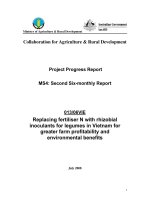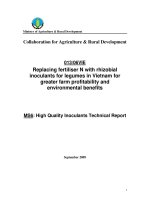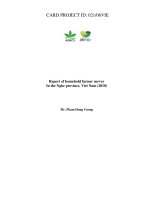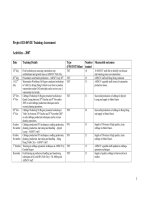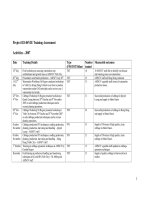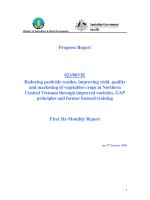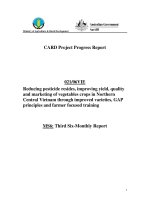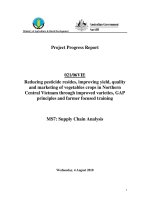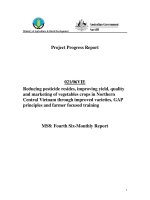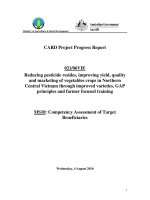Báo cáo khoa học nông nghiệp " Improving traditional integrated farming systems (VAC) – a new livelihood option for poor farmers in the coastal communities " MS7 pptx
Bạn đang xem bản rút gọn của tài liệu. Xem và tải ngay bản đầy đủ của tài liệu tại đây (675.15 KB, 13 trang )
1
Ministry of Agriculture & Rural Development
Collaboration for Agriculture and Rural Development
PROJECT PROGRESS REPORT
027/07VIE
:
Improving traditional integrated farming systems (VAC)
– a new livelihood option for poor farmers
in the coastal communities.
MS7
: Training and Competency Improvement report
June, 2010
2
Table of Contents
1.
Institute Information ___________________________________________________ 1
2. Project Abstract _______________________________________________________ 2
3. Trainng/workshop _____________________________________________________ 2
4. Meetings _____________________________________________________________ 4
5. Exchange visiting______________________________________________________ 6
6. Training for two CEDMA staff in Australia_________________________________ 8
7. Second beneficial approach activities _____________________________________ 10
8. Individual visits ______________________________________________________ 11
1
1. Institute Information
Project Name Improving traditional integrated farming systems (VAC)
- a new livelihood option for poor farmers in the coastal
communities
Vietnamese Institution
Centre for Environment and Disease Monitoring in
Aquaculture (CEDMA)
Vietnamese Project Team Leader
Mr. Mai Van Tai (Project director)
Mr. Vo Van Binh (Project manager)
Australian Organisation
Agriculture and Environment - Division of Science and
Engineering-Curtin University of Technology (CUT)
Australian Personnel
Assoc. Professor Ravi Fotedar (Team Leader)
Prof. Graeme Robertson (Management)
Dr. Jane Fewtrell (Environmental Scientist)
Mr. Simon Longbottom (Aquaculture Scientist)
Date commenced
8
th
February 2009
Completion date (original) January 2010
Completion date (revised)
June 2010
Reporting period
Training and Competency Improvement (MS#7)
Contact Officer(s)
In Australia: Team Leader
Name:
Dr Ravi Fotedar
Telephone:
+61 8 92664508
Position:
International Program Director,
A/Prof
Fax:
+61 8 92664422
Organisation
Muresk Institute, CUT
Email:
In Australia: Administrative contact
Name:
As mentioned above
Telephone:
Position:
Fax:
Organisation
Email:
In Vietnam
Name:
Mr Vo Van Binh
Telephone:
0983105537
Position:
Head of environment Department
Fax:
0241840241
Organisation
Centre for Environment and
Disease Monitoring in
Aquaculture (CEDMA)
Email:
2
2. Project Abstract
3. Training/workshop
Workshop in Hue
The purpose of this workshop was to introduce a new concept to the improved VAC system.
This includes the introduction of earthworms to treat manure before release into ponds and
gardens and the introduction of high valued species. Introducing earthworms to the system
has potential to increase the environmental sustainability of the system while high value
aquatic species introduction plays an important role in generation and/or addition of income.
The number and background of workshop participants is shown in Table 1.
Discussion focused on the feasibility of the model. RAS in rural areas, where electricity is
not always available, is the main bottle neck for adoption of this system. However, in most
cases, the adaptation and modification of the traditional VAC by applying a RAS is possible.
Conclusion: With increasing demand on aquatic production, the traditional VAC system
requires modification to increase efficiency. The improved VAC system can address this
issue, but prior to installation the financial cost of set up and operation must be considered on
an individual basis.
Table 1: Participant composition of the inception workshop in Hue (4
th
December, 2008)
Participant background Number
Farmers from project provinces 20
Extension officials (Hue, Quang Tri, Quang Binh, Ha Tinh, Nghe an and Quang Nam) 7
Animal health management 1
Provincial Aquaculture Division (six project provinces) 6
Agricultural and Rural Development staff 4
Aquaculture Development Department 1
International experts 2
Research Institute for Aquaculture No.1 12
This project is expected to make a significant contribution to the Government of Vietnam’s
Comprehensive Poverty Reduction and Growth Strategy (CPRGS), which is aligned with the
CARD program strategic framework. The project is expected to improve the productivity of
traditional VAC farming practices through the farming of high-value aquatic species and
following better managed farming practices in an environmentally friendly manner. The outcome
of the project will assist in improving the management of all components of VAC farming. Project
activities have included;
i) Surveys to collect base-line information on the economic status of farmers participating in
traditional VAC farming systems in four selected districts of Vietnam.
ii) Selection of twenty (20) demonstration sites, of which, 18 are completely operational. The set
up includes semi-intensive culture systems based on recirculating aquaculture system (RAS)
technologies and have been stocked with local, high-value species including snake head fish,
grouper, frog, brackish water white eel and soft-shell turtle.
iii) The operational plan for each site has been disseminated to local extension workers, the
households of modified VAC systems and other interesting farming households.
3
Figure 1: Photographs of discussion during the inception workshop in Hue.
Training workshop in Quang tri
This workshop was for participants among project provinces including; Thanh Hoa, Nghe
An, Ha Tinh, Quang Binh Quang Tri and Hue. The workshop gave participants a forum to
discuss and share experiences, knowledge, skills and technology for introducing the RAS to
the traditional VAC system. The development of new guidelines for the improved VAC
system was also discussed.
Objectives of workshop:
The main objective of the training/workshop was to discuss;
i) issues with adoption of the improved VAC system
ii) advantages of the model in terms of environmental sustainability and economic
aspects
iii) continuation and dissemination of technology subsequent to project conclusion.
The participants included aquaculture extension officers from provincial, district and
commune levels and farmers (Table 2)
Conclusion:
Extension staff agreed that the improved VAC systems installed at the demonstration sites
proved to be beneficial, both economically and environmentally and that they will adopt the
model into their national program.
The training/workshop met the expectations of the extension workers and farmers.
Table 2: Participant composition of the training/workshop in Quang Tri (6-8
th
April 2010)
Participant background Number
Farmers 12
Extension officers of 6 provinces 11
Extension station staff 11
Provincial Aquaculture Division staff 2
Agriculture and RD staff from each province 2
Commune Extension staff 2
International experts 3
4
Research Institute for Aquaculture No1staff 6
Research Extension staff stationed in North-Mid- Provinces 5
Peoples Committee of Commune 2
Figure 2: Photographs from the workshop in Quang Tri and the subsequent visit to a
demonstration site.
4. Meetings
Meetings in Ha tinh
In this province, there are 4 demonstration sites. The species cultured at each site are;
i) grouper (rearing),
ii) white eel larvae,
iii) snake head fish in tanks, and
iv) turtle together with snake head fish in tanks.
A total of 41 farmers participated in these meetings, contributing to the development of the
model.
These meetings have provided the opportunity at each stage of system construction for
farmers on demonstration sites to approach project staff and discuss aspects of the adoption
of the improved VAC system that should be considered and modifications that have the
potential to improve system efficiency while minimizing costs.
5
Figure 3: Photographs of training activities in Ha Tinh.
Meetings in Nghe An
There are 2 demonstration sites in this province. One site was developed in 2008 for eel
(Anguilla macmorata) culture, however, it is now used for snake-head fish culture.
The meetings were designed for farmers in the village in which the demonstration sites were
situated. The meetings included 30 participants, of which 2 were leaders of the village, 2
extension staff and the remainder were farmers.
The outcomes from the meetings included that there be an emphasis on minimizing the
financial investment from farmers for the construction and operation of the improved VAC
system. Also, it was recommended that species such as eel might not be suitable for culture
in the improved VAC system due to the relatively long period of time taken to reach
marketable size (ie 24 months).
Meeting in Thanh Hoa
Discussions were held in Thanh Hoa on the expansion of the improved VAC system at the
demonstration site (Mr Thu) to include earthworm culture and snakehead fish in cages and
tanks. A meeting has been organized to take place on completion of the expansion. The
participants will include 16 farmers and commune leaders.
Discussion also included the implementation of a plan for many of the farmers in this
province to include snakehead fish in their VAC systems despite it being winter.
6
Figure 4: Group discussion in Quang Xuong Thanh Hoa on expanding the improved VAC
model at the demonstration site.
5. Exchange visiting
Exchange visits that included farmers from demonstration sites and other farmers interested
in learning more about the improved systems were an important learning tool. The visits
provided the opportunity to discuss issues and experiences with construction and operation of
the improved VAC system. These visits were organised and conducted both within each
province and between different provinces. While visits between provinces were time
consuming to organise and implement, they provided farmers with valuable information on a
diverse range of issues and ideas that could be applicable to their situation.
Under the supervision of CEDMA staff, local extension officers were given the opportunity
to coordinate and lead exchange visits. Details of the exchange visits to date are;
9 Within provinces;
• seven exchange visits (each province has 1 visit, especially Quang Tri had 2
visit)
• 16 participants in Hue, 60 participants in Quang Tri, 16 participants in Ha Tinh,
30 participants in Nghe An, and 85 participants in Thanh Hoa
9 Between provinces;
• Three exchange visit
• 16 participants (8 famers and 8 extension staff) each province selected to gather
into three group to visit demonstration from other provinces
Exchange visit in Hue
• Purpose of the exchange
- Knowledge transfer to end users (ie. farmers involved with the project, farmers
interested in being involves and extension staff)
- Encourage the link between farmers on sites with common elements and could
therefore, benefit from each other’s knowledge and experiences
- To give extension staff an opportunity to organize the extension activity,
providing them with experience that will enable them to continue organising and
implementing these activities without supervision after the completion of the
project.
• Address of the visit
- All project sites
7
- Developed aquaculture sites from which farmers can learn relevant methods and
technologies for possible adoption in their improved VAC.
• Participants
- Farmers involved in the project and farmers not involved but who were interested
in developing and using the technology shown at the project sites.
- Leaders of the communes (Chairman, Head of Agriculture Division, and Leader
of Farmer Union)
- Extension staff
- Provincial Aquaculture Division staff.
Figure 5: Photographs of exchange visit activities in Hue province.
Exchange visit in Quang Tri
• Purpose of the visit
- The system at the demonstration site in Quang Tri has successfully cultured
snake-head fish in tanks. This knowledge gives farmers who do not have fish
ponds the potential to generate new income from aquaculture in tanks. Thus,
project staff encouraged farmers in the area to visit demonstration site.
- Farmers learn through observation directly, and in turn they can apply the
technology to their farms.
• Sites to be visited
- Two project demonstration sites
- Frog culture in Quang Tri
• Participants
- Farmers who want to adopt the improved VAC system
- Provincial, district and commune extension staff
- Leaders of communes
• Achievements:
- Knowledge gained by farmers during the demonstration visits
- Creating a relationship between farmers and extension staff
8
Figure 6: Photographs of visiting two demonstration sites and other developed
aquaculture systems in Quang Tri
6. Training for two CEDMA staff in Australia
Duration: The training in Australia took place between February 13
th
to March 8
th
2010
Venue: Curtin University, Perth, Australia
Purpose: Consolidation and implementation of project data and information
Trainees: Mr. Vo Van Binh, project manager (Head of Environment Department, CEDMA)
and Mr. Dao Van Phu, project staff (staff of Environment Department, CEDMA).
The training was successful, the trainees acquired knowledge and skills that will prove useful
in future projects. The itinerary of the training visit is shown in Table 3.
Table 3: Itinerary of CEDMA staff training visit to Australia.
Date Visit place Activities Remarks
Feb 24
th
Arrived Perth Introduction of Curtin Visit the lab at Curtin
Feb 25
th
Curtin University Discussion of project
Data consolidation
Feb 26
th
Farm visit in Busselton Farm visit: Crayfish culture
and business
Feb 27
th
Busselton Farm visit: Crayfish culture
and business
How Crayfish are
exported to
Singapore
Feb 28
th
Bridgetown Farm visit
March 1
th
Bridgetown Hester dam visit Water quality
management for a
newly dam
established
9
March 2
th
Curtin University Discussion of project
Data consolidation
March 3
th
Curtin University Water quality management
(practices)
Improve analysis
skill for visit staff
March 4
th
CARL Hatcheries visit Environment
consideration in a
hatchery
March 5
th
Visit zoo Farm show Learn the farming in
Western Australia
March 6
th
Perth Shopping/preparation to leave
for Vietnam
March 7
th
Back to Vietnam
Figure 7: Photographs of visit to a hatchery in Fremantle (Challenger TAFE) to learn water
quality management for newly hatched fish species.
Figure 8: Learning water quality analysis and interpretation of the results in the CARL
laboratories at Curtin University.
10
7. Secondary beneficiary activities
During the implementation of the demonstrations, there were meetings with farmers who
were not part of the project but had visited the demonstration sites and wanted to apply the
technology of the improved VAC to their facilities. For example, at least four farmers that
visited the snake-head demonstration site in Thanh Hoa used the technology and methods
shown to prepare ponds and earthworm houses on their farms (winter). Early in summer
(2010) they stocked worms into the earthworm houses and snake-head fingerlings into the
cages and tanks.
Table 4 lists the current secondary beneficiaries of the introduced technology and their
activities.
Table 4: Current second beneficiaries of the project
Farmers’ name Address Models
Thanh Hoa
Mr. Dung Quang Giao, Quang Xuong,
Thanh Hoa
Snake-head in tanks and
cages
Mr. Hieu Quang Giao, Quang Xuong,
Thanh Hoa
Snake-head in tanks and
cages
Mr. Nam Quang Giao, Quang Xuong,
Thanh Hoa
Snake-head in tanks and
cages
Ms. Phuong (Extension staff) 23 Phan Boi Chau, Thanh
Hoa town
Proposal of Improved VAC
for Farmers in Thanh Hoa
Nghe An
Mr. Ta Van Hop Quynh Lap, Quynh Luu,
Nghe An
Earthworm + Snake head in
tanks
Mr. Ho Van Luong Quynh Lap, Quynh Luu,
Nghe An
Earthworm + Snake head in
tanks
Mr. Truong Quang Trat Quynh Lap, Quynh Luu,
Nghe An
Earthworm + Snake head in
tanks
Mr. Nguyen Van Tong Quynh Lap, Quynh Luu,
Nghe An
Snake head in tanks
Mr. Nguyen Duc Hoa Quynh Lap, Quynh Luu,
Nghe An
Snake head in tanks
Mr. Nguyen Sy Linh relative Thanh Cat, Thanh Chuong Earthworm Business
Ha Tinh
Nguyen Van Thuong Thach Ha town Earthworm + snake head fish
Ms. Nguyen thi Dieu Thanh Ha town Writing proposal of
improved VAC (already
accepted)
Mr. Nguyen Viet Nhat
(Business promotion, Thach
Ha)
Thach Ha Town Use Mr. Huy demonstration
as extension material (video
and visiting place)
Quang Binh
Agriculture new-paper Quang Binh Use Mr. Tuan hatchery as
material for an extension
article
Quang Tri
Mr. Tung (Vice Director, Quang Tri Extension Centre Use Mr. Thieu and Mr. Sinh
11
Extension Centre) demonstrations as extension
material (TV, video and
visiting place)
Hue
VTV Hue Aquaculture division Hue Use Mr. Truc demonstration
as extension material (TV)
8. Individual visits
The project encouraged farmers to visit aquaculture centres/institutes, such as RIA 1 and its
centres, and farms that demonstrated examples of advanced earthworm culture. The visits
were to address specific requirements of some farmers who want to develop a system similar
to the improved VAC.
• Mr. Tuan (Le Thuy, Quang Binh) has visited RIA 1 to learn relevant aquaculture
principles and techniques. With the knowledge gained in the constructed and operates
a successful hatchery based on the principles of the improved VAC system.
• Mr. Dung visited RIA 1 as part of the CARD project to gain knowledge in fingerling
nursing in hapas and tanks.
Figure 9: Photographs of discussion about the implementation of the hatchery for Quang
Binh (Mr. Tuan)
